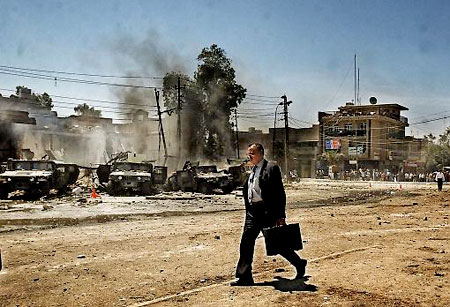|
by Mehdi Hasan
Saddam is gone... but at what cost?
in the al-Waziriyah quarter of Baghdad, April 2004. Photograph: Moises Saman/Magnum Photos, April 2004.
On Saturday 15 February 2003, more than a million of us - students, toddlers, Christians, Muslims, nuns, Telegraph readers - gathered in Hyde Park for the biggest public demonstration in British history.
“Not in my name,” we chanted, as a series of speakers - from Charles Kennedy to Jesse Jackson - lined up to denounce the impending invasion of Iraq. In Glasgow, a sombre yet defiant prime minister delivered a speech to Labour Party activists.
Responding to the march in London, Tony Blair declaimed:
He continued,
Whether or not Blair’s conscience remains “clear” is, as he once pointed out, between him and God.
But a decade on from the debate about dodgy dossiers, WMDs, 45-minute warnings and various clauses and sub-clauses of UN Resolution 1441, those of us who marched against the war stand vindicated.
We were right; the hawks were wrong...
Remember the rhetoric?
It was a farrago of lies and half-truths, of delusion and doublethink.
Aside from the viewers of Fox News, most people
are now aware that there were no weapons of mass destruction in Iraq, no
ties between secular Saddam and Islamist Osama. The fall of the Ba’athist
dictatorship failed to usher in a democratic or human-rights revolution.
Every argument advanced by the hawks proved to be utterly false.
The invasion and occupation of the country,
There may have been a strong moral case for toppling the tyrant and liberating the Iraqi people - but there was a much stronger moral case against doing so.
Brutal and vicious as
Saddam’s reign had been, a
“humanitarian intervention” could not just be justified in March 2003, given
the complete absence of an ongoing or imminent mass slaughter of Iraqis.
Some of us warned that the cost of action, in blood and treasure, would far
outweigh the cost of inaction.
The greatest weapon of mass destruction turned out to be the invasion itself.
Over the past ten years, Iraqis have witnessed the physical, social and economic destruction of their country:
Between 2003 and 2006, according to a peer-reviewed study in the Lancet medical journal, 601,000 more people died in Iraq as a result of violence - that is, bombed, burned, stabbed, shot and tortured to death - than would have died had the invasion not happened.
Proportionately, that is the equivalent of 1.2 million Britons, or six million Americans, being killed over the same period. In a typically defensive (and deceptive) passage in his memoirs, Blair described the Lancet report as “extensively challenged” and said its figures were “charged with being inaccurate and misleading”.
Sir Roy Anderson, the then chief
scientific adviser to the Ministry of Defence, told ministers in an internal
memo that its methods were “close to ‘best practice’” and the study design
was “robust”.
They dispute the studies that have uncovered the human cost of the war - whether it be the civilian casualties across the country, or the torture and abuse inside Iraq’s prisons (which a UN investigator described in 2006 as “worse than it has been in the times of Saddam Hussein”), or the fivefold increase in birth defects and fourfold increase in cancers in and around Fallujah.
Or they try to blame the violence and turmoil in Iraq exclusively on terrorists, “jihadists” and “Islamofascists”. Few would dispute that most of the killings in Iraq have been carried out by the sadistic monsters who fight for al-Qaeda and its affiliates.
But to focus only on the crimes of AQI (or “al-Qaeda in Iraq”) represents a gross moral evasion.
The war made Iraq, in the approving words of the US general Ricardo Sanchez,
The Iraq invasion turned out to be the best recruiting sergeant that Muslim extremists could ever have prayed for, radicalizing thousands of young men from the Middle East to the Midlands.
Listen to the verdict of the former head of MI5, Dame Eliza Manningham-Buller:
Ultimately, say some hawks, such arguments are irrelevant.
Didn’t Iraqis welcome the removal of Saddam? Despite the bloodshed, isn’t their nation better off as a result of the war?
Not quite.
In September 2011, a Zogby poll found that 42 per cent of Iraqis thought they were “worse off” as a result of the Anglo-American invasion of their country, compared to only 30 per cent of Iraqis who said “better off”.
An earlier poll, conducted for the BBC in
November 2005, found a slim majority of Iraqis (50.3 per cent) saying the
Iraq war was “somewhat” or “absolutely” wrong.
The post-Saddam government, observes the noted Iraqi novelist and activist Haifa Zangana, is,
The Human Rights Watch 2012 report shows how the rights of the Iraqi people are “violated with impunity” by their new rulers.
In his book Iraq - from War to a New Authoritarianism, Toby Dodge of the London School of Economics documents how the war has produced an Iraqi system of government not so different from the one it replaced.
Prime Minister Nouri al-Maliki, Dodge
argues, is leading his country towards “an incredibly destructive
dictatorship”. The establishment of a liberal democracy on the banks of the
Tigris remains a neocon pipe dream.
Iraq has been destroyed and hundreds of thousands of innocent people have lost their lives, as the direct result of an unnecessary, unprovoked war that, according to the former chief justice Lord Bingham, was a “serious violation of international law”.
Iraq turned Talleyrand’s aphorism on its head -
it was worse than a blunder; it was a crime.
|

